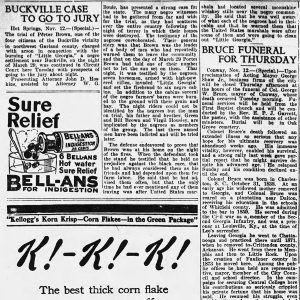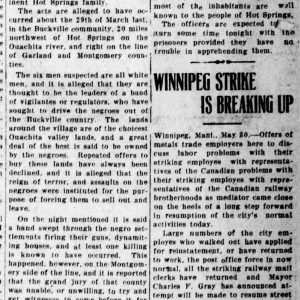calsfoundation@cals.org
Housley v. State
On November 13, 1919, Virgil Housely was convicted of arson and sentenced to two years in an Arkansas prison for his alleged role in the March 29, 1919, attack on the African American settlement of Little Georgia (Garland County). Housley’s conviction was later overturned by the Arkansas Supreme Court.
On the evening of March 29, 1919, six or seven men gathered to attack the African American residents of Little Georgia, possibly in hopes of seizing valuable farmland. They swept through the town, firing guns, setting fire to homes with torches, and throwing dynamite. After the incident, most Black families fled Little Georgia, and it was not until the end of May that authorities were able to identify and arrest six men (described in a newspaper article as prominent) and charge them with nightriding (in accordance with Act 112 of 1909), among other crimes. Those charged were Virgil Housely, Sam Housely, Frank Housely, Bill Brown, Porter Brown, and Green Brown.
Virgil Housely was brought to trial on November 12, 1919. Several of the African American residents of Little Georgia testified for the prosecution. Housley’s neighbor, Ples Miller, testified that about a month before the attack on Little Georgia, Housley tried to recruit Miller into a group that would attack the Black residents of Little Georgia “and maybe dynamite one or maybe kill one.”
Housley’s defense team focused on the testimony of Housley’s family members, who claimed that Housley was at home at the time of the attack. Housley testified on his own behalf that several residents of Little Georgia, including Garland Carroll, owed white neighbors money and that there was talk in the community of attacking debtors as punishment for failing to pay their debts. Housley adamantly denied any involvement with the attack on Little Georgia and claimed to have no knowledge of who might have been responsible for the attack.
John Hoskins (lead prosecutor) ended his closing statement in the Housley trial with a plea for the jury to look beyond race. He painted a vivid picture of the destruction wrought by the arsonists and argued that “the man who crept under the cover of night to a fellow man’s home, be he black or white, was a dangerous character to the whole community.” On November 13, 1919, the jury convicted Housley of arson and sentenced him to two years in prison.
On April 5, 1920, the Arkansas Supreme Court granted Housley’s request for a new trial. The court concluded that one of Housley’s co-defendants should not have been allowed to testify against Housley. The court ordered the co-defendant’s testimony to be thrown out and prohibited any testimony from co-defendants in any retrial of Housley. The court also found that there was “insufficient evidence upon which to establish a conspiracy” in all the cases against the arsonists.
The stage was set for another round of trials, but after the Arkansas Supreme Court overturned Housley’s conviction, the historical trail turns cold. Available newspapers and court records give no indication that Housley ever faced another trial. Nor were his alleged conspirators brought to trial.
The reign of terror in Little Georgia failed. African Americans returned to their homes, rebuilt, and retained control of their rich farms. Conflicts continued to simmer, but there were no more attacks like the 1919 raid. By 1951, area residents had moved several cemeteries to higher ground, beyond the area destined to be flooded by the creation of a dam and reservoir. On July 4, 1956, the Blakely Mountain Dam created Lake Ouachita, which covers 48,000 acres of land, including the area that once comprised the community of Little Georgia and nearby areas inhabited by whites.
In the twenty-first century, many of the African American farmers who worked the land near Little Georgia and the arsonists who tried to force them out rest just a few feet away from each other in relocated cemeteries a short distance from Lake Ouachita.
For additional information:
“In the Supreme Court of Arkansas, Housley v. State.” April 5, 1920, Garland County Courthouse Archives, Hot Springs, Arkansas.
“Jury Still Out in Arson Trial.” Hot Springs New Era, November 13, 1919, p. 1.
“Little Georgia Cases Continued.” Arkansas Democrat, November 18, 1919, p. 2.
“State of Arkansas vs. Virgil Housley.” Trial Transcript, University of Arkansas at Little Rock William H. Bowen School of Law Library, Little Rock, Arkansas.
“Six Men Are Brought In.” Hot Springs New Era, May 31, 1919, p. 1.
“Six Prominent Men Are Charged with Arson, Night-Riding and Worse.” Hot Springs New Era, May 30, 1919, p. 1.
Thrasher, Christopher. “‘A Reign of Terror in Little Georgia.” Arkansas Historical Quarterly 81 (Autumn 2022): 293–309.
“Verdict Set Aside.” Hot Springs New Era, December 8, 1919, p. 3.
Christopher Thrasher
Fayetteville Technical Community College
 Early Twentieth Century, 1901 through 1940
Early Twentieth Century, 1901 through 1940 Law
Law Little Georgia Incidents Article
Little Georgia Incidents Article  Little Georgia Incidents Article
Little Georgia Incidents Article 



Comments
No comments on this entry yet.